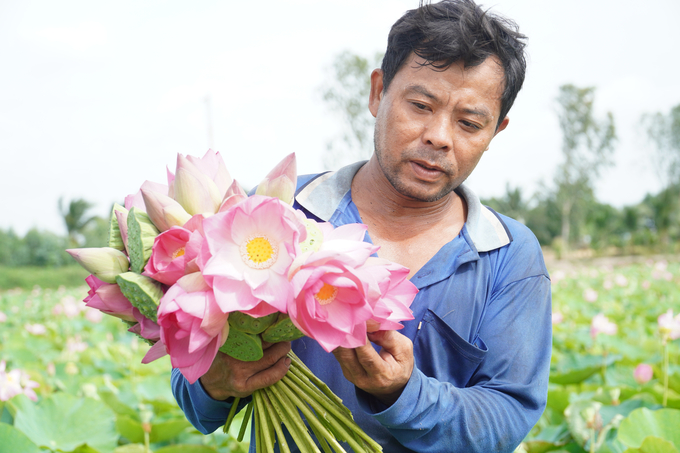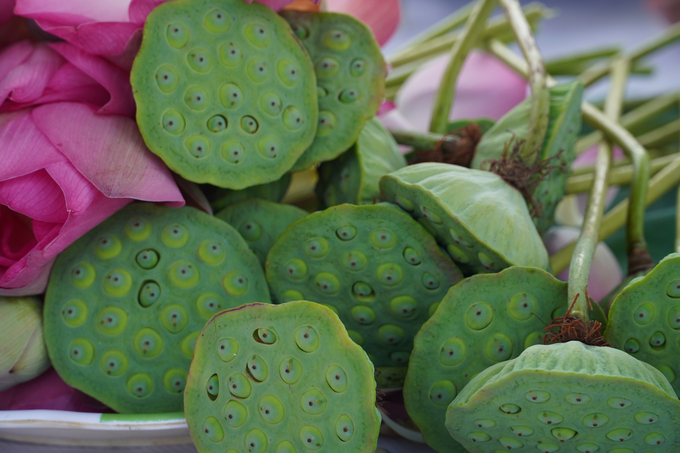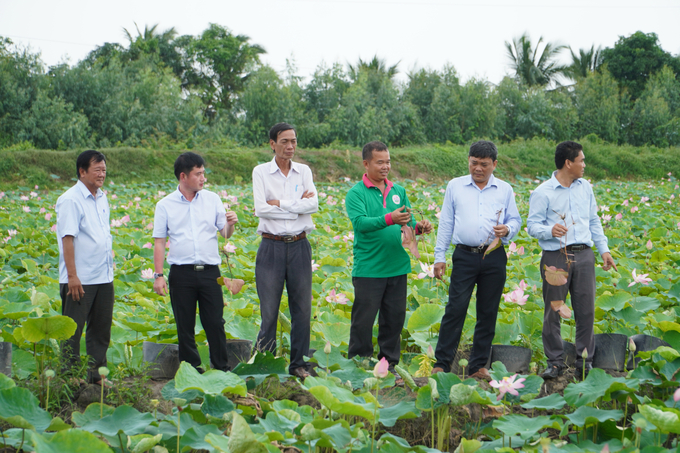June 19, 2025 | 07:21 GMT +7
June 19, 2025 | 07:21 GMT +7
Hotline: 0913.378.918
June 19, 2025 | 07:21 GMT +7
Hotline: 0913.378.918

Lotus is one of the key industries of the "Project to Restructure Dong Thap Province's Agriculture," with an area of more than 1,800 hectares. Photo: KT.
Lotus is one of the key industries of the "Project to Restructure Dong Thap Province's Agriculture," with an area of more than 1,800 hectares. Currently, the locality has more than 100 products processed from lotus, many of which are chosen as gifts and exported to many countries around the world.
Linking to consume products between businesses and farmers has helped Dong Thap's lotus industry build a stable and sustainable raw material area that meets market requirements. Besides, actively participating and organizing market promotion has created conditions for lotus products to gradually conquer demanding markets.
Mr. Ngo Dinh Dung, Director of ISM Consulting Company, said that thanks to many solutions to expand and access the market, creating opportunities for international cooperation and lotus export, Dong Thap province recently exported the first shipment of lotus root to Japan with a quantity of 15 tons and a value of approximately VND 1 billion, marking a milestone in bringing indigenous lotus products into one of the world's most demanding markets.

Linking to consume products between businesses and farmers has helped Dong Thap's lotus industry build a stable and sustainable raw material area that meets market requirements. Photo: KT.
According to Mr. Nguyen Phuoc Thien, Vice Chairman of the Dong Thap Provincial People's Committee, the lotus industry has developed strongly in recent years. Through processing, value-added products from Dong Thap lotus are well known to many domestic and foreign friends. However, regarding highly increasing added value, deeply processing quality products, commercializing, and diversifying products to meet domestic and international market needs, Dong Thap's lotus industry has currently not met expectations, and its development is not commensurate with the locality's position and potential.
Mr. Thien directed that in the coming period, the locality needs to develop the value chain of the lotus industry in the direction of increasing added value. In particular, focus on building and developing quality raw material areas and promoting deep processing to help the lotus industry develop more sustainably.
According to plan No. 310/KH-UBND, Dong Thap province will develop the lotus industry with the goal of "reducing costs, improving quality, and increasing processed products." The locality focuses on developing products in the direction of quality, safety, high added value, and following market demand; strengthening the close linkage between production and consumption; applying science and techniques and advanced technology in a synchronous manner; creating stable raw material areas; and creating products with sufficient quantity, quality, and competitive prices.

In the coming period, the locality needs to develop the value chain of the lotus industry in the direction of increasing added value. Photo: KT.
Currently, businesses are investing in researching many new products with high applicability according to market signals, such as activated carbon from lotus seedpods, bioplastics from lotus fibers, lotus essential oil, or lotus used in cosmetics and pharmaceuticals. These are potential products that create great breakthroughs by combining science and technology with typical indigenous crops, thereby contributing to improving the added value of the entire lotus value chain.
Ms. Vu Kim Hanh, Director of the Business Studies & Assistance Center (BSA), said that to develop a sustainable value chain for the lotus industry, Dong Thap businesses need to have a more focused solution to exploit the industry, prioritizing the development of new product lines based on the application of technology and creativity, and have new marketing and distribution solutions to help products reach the market faster and deeper.
Dong Thap has developed 59 OCOP products from lotus. Among them, there are 30 3-star OCOP products, 28 4-star OCOP products, and one 5-star OCOP product.
By the end of 2023, the lotus growing area in Dong Thap province had reached 1,838 hectares, exceeding 31.3% of the 2025 target of 1,400 hectares. Currently, 52 lotus varieties have been collected and bred. The locality continues to strengthen research and application of lotus varieties suitable to natural conditions and expand production of specialized lotus varieties to serve different needs.
Translated by Thu Huyen

(VAN) To address plastic pollution, closing the plastic recycling cycle will bring significant economic and environmental benefits.

(VAN) According to the Binh Thuan Department of Industry and Trade, in the first five months of 2025, Binh Thuan's dragon fruit export turnover increased by 20.65% compared to the same period last year.

(VAN) EU countries on Thursday gave final approval to new tariffs on fertilizer imports from Russia, a move aimed at cutting off revenue that could support Moscow’s war in Ukraine, despite concerns from European farmers.

(VAN) The working delegation from the Ministry of Agriculture and Environment conducted an important trip to the Netherlands to strengthen strategic partnerships and sustainable development in the agricultural sector.

(VAN) The letter ‘A Plea from the Ocean’ not only evokes emotion but also awakens the human conscience to the responsibility of protecting life on Earth.

(VAN) The Department of Agriculture in South Africa has announced the country’s first mass vaccination of poultry to prevent local birds from contracting avian influenza.

(VAN) Establishment of the Mekong Delta Regional Agricultural Linkage Center, aiming for a closed value chain, deep processing, trading platforms, and international market connectivity.